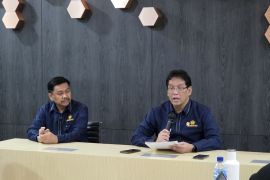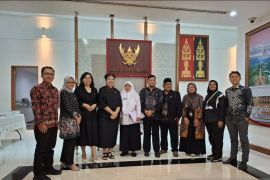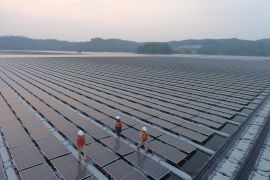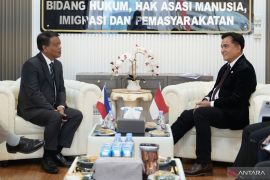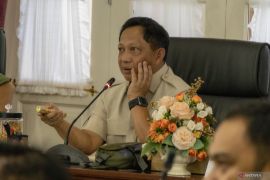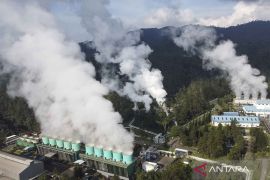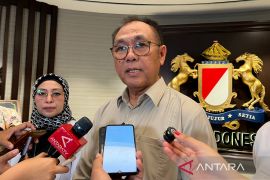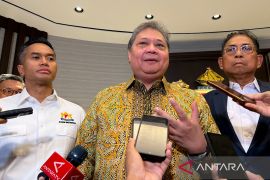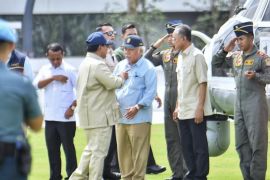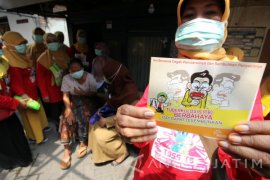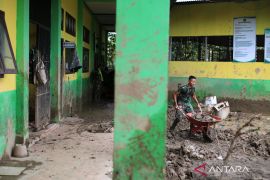Indonesia`s economic prospects remain strong as it enters 2016 since it took significant steps over the past few years.Jakarta (ANTARA News) - Indonesias economy grew at a slow pace in 2015 due to internal and external factors but government is confident of solid prospects as it enters 2016 since it has laid a strong economic foundation.
The global pressures and economic downturns, coupled with internal factors such as a drop in exports, low budget absorption, decline in the rupiahs exchange rate and weakening of the peoples purchasing power, contributed to a slowdown in Indonesias economic progress.
However, Indonesias economic prospects remain strong as it enters 2016 since it took significant steps over the past few years.
"In 2015, we were able to build a good and strong foundation," President Joko Widodo (Jokowi) stated while opening a plenary cabinet meeting at his office in Jakarta on December 23, 2015.
The International Monetary Fund (IMF) also confirmed that the countrys economic prospects remain solid, thanks to the significant steps it took over the past several years.
"They (the Indonesian government) have demonstrated wise monetary and fiscal management policies, supported by historic fuel oil subsidy reforms in 2015," Luis E. Breuer, the IMF team leader in Indonesia, said in a statement made available to ANTARA last week.
The indications of the national economic slowdown were visible in the first half of 2015. According to the Central Bureau of Statistics (BPS), the economy grew by 4.67 percent year-on-year in the second quarter, down from 5.12 percent in the same period last year.
The second-quarter growth also declined when compared to 4.71 percent growth rate in the previous quarter.
Indonesias economic growth started showing signs of improvement in the third quarter when it rose to 4.67 percent year-on-year, fueled by government spending and household consumption.
Overall, the economic growth during the January-September 2015 period stood at 4.71 percent. The government has forecast that the economy will grow by 4.9 percent in the fourth quarter. Thus, it implies that the economic growth will fall short of its target of 5.5 percent for the entire year of 2015.
The IMF team is of the view that what has been done by the Indonesian government has contributed to Indonesias macroeconomic stability and supported growth. "As a result, Indonesia could trudge the path safely amid difficult external environment in 2015 due to a fall in commodity prices, the shift in the global financial condition and the slowing down of growth in countries that were Indonesias trade partners," noted Luis E. Breuer.
As per the IMF, Indonesia has advantageous mid-term prospects supported by inclusive growth policy agenda, that have set Indonesia in the path towards stability.
Overall, the IMF viewed Indonesias macroeconomic performance in 2015 as satisfying with a stable economic growth projected at 4.7 percent. It is seen as a moderate acceleration to pursue an economic growth prediction of about 5.0 percent in 2016.
"Investment activities will lead to recovery, especially in the public expenditure sector. Weak commodity prices and demand from Indonesian trade partners will improve and will contribute to growth. Inflation will also sharply fall to a predicted 3.0 percent at the end of 2015. Next year (2016), it is expected to be in the range of 3.0-5.0 percent," he said.
Besides that, external transaction deficit is also expected to narrow significantly in 2015, estimated at 2.0 percent of the Gross Domestic Product (GDP) with low imports. Import projection in 2016 will, however, increase due to increasing domestic demand.
"Fiscal deficit in 2015 is predicted to increase though it will remain under 3.0 percent of the GDP," stated Breuer.
Therefore, President Jokowi has expressed belief that the nations foundation is strong enough to meet the challenges in 2016 in terms of budget policy, infrastructure growth, and country-centric development.
"In 2015, we have built a good and strong foundation," he stated while opening a plenary cabinet meeting at his office here on Wednesday (Dec 23).
With regard to the budget policy, he explained that the government had shifted the fuel oil subsidy to programs that directly benefit the people.
The government has also expedited infrastructure development, including of toll roads, railway lines, airports, and seaports, he added.
"We have also altered the orientation of development, which is no longer centered in Java but in Indonesia as a whole, starting from the outermost and the most backward regions," he remarked.
With such a strong foundation in place, he hoped Indonesia would progress faster and strive harder as the challenges in 2016 are more difficult compared to those encountered in 2015.
President Widodo affirmed that 2015 was a year full of challenges for Indonesia ranging from the global economic slowdown, the plummeting commodity prices, forest and peatland fires in various regions in the country, and depreciation of the countrys rupiah against the US dollar.
He stated that the global economy would not fully recover next year, and it would be a challenge in itself.
He, however, hoped that the economic slowdown would not worsen next year.
"We will also face an era of competition, and at the regional level, we are all aware that we will enter the era of the ASEAN Economic Community," he added.(*)
Reporter: Andi Abdussalam
Editor: Heru Purwanto
Copyright © ANTARA 2015
